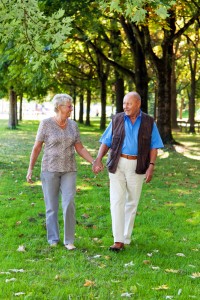Eight Reasons Seniors Should Be Socially Engaged
 We humans are “hardwired” to crave and rely on human contact. Unlike, for example, a turtle, which hatches from a buried egg and is on its own from that moment on, people depend on other people for survival.
We humans are “hardwired” to crave and rely on human contact. Unlike, for example, a turtle, which hatches from a buried egg and is on its own from that moment on, people depend on other people for survival.
Brain experts explain this “wiring”: early human beings lived in small, interdependent groups. To survive and thrive, individuals needed to be finely attuned to their fellow tribesmen, so the part of our brain that controls communication is very large and developed. Just as humans have a built-in desire for food, water and sleep, we also have a deep need to connect with other people.
Deprived of engagement with others, human beings experience a condition that is damaging and distressing: loneliness. Loneliness can be a debilitating, distressing condition for humans. Consider that prisoners can be controlled with the threat of solitary confinement. And most people can identify with the scene in the movie Cast Away where Tom Hanks, marooned on a deserted island, creates a “companion” by drawing a face on a volleyball that has drifted ashore.
Experts on aging have long suspected that socialization improves physical and emotional well-being, increases mental alertness and encourages a more active lifestyle. New research studies confirm these benefits and more, pinpointing the mechanisms behind the protective properties of human interaction that lessen the risk of Alzheimer’s disease, promote heart health, improve symptoms of depression and minimize the effects of stress.
For many years, research focused on the “practical” view of socialization. As they grow older, people with more developed social connections can get a ride to the doctor, find someone to lend a hand with physical care, go out to dinner with companions, walk around the park with a social group. And this is indeed an important part of the picture. But we now know that this isn’t the whole story of why social engagement is so important. Here are some recent studies on the healthy aging benefits of spending time with others:
- A UCLA study demonstrated that loneliness decreases the efficiency of the human immune system. Study author Dr. Steven Cole says, “The biological impact of social isolation reaches down into some of our most basic internal processes—the activity of our genes.” Several other studies also confirm that people with strong social connections exhibit stronger immunity against disease.
- Blood Pressure: University of Chicago researchers showed that loneliness is linked to high blood pressure. Stress seems to be a key element of this connection. Author John Cacioppo points out that lonely individuals are less likely to approach stressful situations with “active coping and attempting to problem solve,” and this leads to a hypertension-promoting passive reaction. For humans, discussing one’s problems with someone else is an instant stress buster.
- What about brain health? An American Academy of Neurology study examining stress and dementia confirmed that people who are socially active may be less likely to develop cognitive impairment. And Harvard School of Public Health researchers showed that an active social life slows memory loss. In another University of Chicago study, MRI scans confirmed the negative impact of loneliness on brain health.
- Physical activity is frequently called the number one ingredient for healthy aging—and social connections promote increased exercise. According to the International Council on Active Aging, one of the main predictors of maintaining a senior fitness program over time is the good old “buddy system.” So keep yourself motivated, and surround yourself with other people who will support your fitness goals.
- Depression is one of the most common challenges of growing older. Interacting and engaging with others is a powerful depression fighter. The American Sociological Association examined the connection between depression and feelings of loneliness, finding that the two are intertwined. Untreated, depression can cause a senior to withdraw from social engagement—but it is important to remember that spending more time with others can help “jump start” recovery.
- Physical pain unfortunately becomes more common with age. A Harvard Medical School study showed that maintaining social connection with others can be an important tool in decreasing the impact of pain by reducing stress and depression. People who are dealing with the challenges of chronic pain also report the positive effects of participating in support groups.
- Gerontologists have long known that social isolation is a big risk factor for malnutrition. A Universite de Montreal study found a clear correlation between nutrition and social interaction. Seniors who live alone often say that it is “just too much trouble” to fix a nutritious meal for one, and they may skip meals or get in the habit of snacking on junk food. This can lead to a serious weight loss—or, in some cases, to obesity, when a lonely person turns to food for companionship.
- It may seem paradoxical, but socialization with a large number of people has also been shown to have a positive impact on our primary relationships. An article in the AARP Bulletin pointed out that “even though Americans are closer to their spouses than ever before, that kind of intimacy can work against us if we allow ourselves to ‘cocoon’ within the relationship.” In the same way, too much reliance on the parent/child bond can strain that relationship, even when parents and children are the kind who describe each other as “best friends.” Seniors who socialize not only with family members but also with their peers have better emotional, intellectual and physical health.
Yes, as we grow older, it takes a little more effort and more planning to stay fully engaged with life, but the rewards are great. For most people, socialization is as important as physical activity. It is worth it to make the effort, make a plan, to add more socialization to your life!
This article was provided by Mark Stappenbeck, Owner and Manager of Assisting Hands Home Care of Bergen County. For more information on Assisting Hands, visit the website at assistinghands.com



















